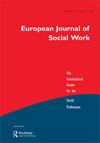Editorial
IF 1.6
3区 社会学
Q2 SOCIAL WORK
引用次数: 0
Abstract
Every year, as editors, we present a comprehensive overview of the ins and outs of our journal to the members of the Editorial Board. This allows us to set our shortand long-term strategic and operational goals in order to further strengthen the European Journal of Social Work as an academic forum where researchers in all areas of social work can exchange knowledge by publishing, disseminating and debating matters of research, theory, policy, education and practice. One of the elements that are addressed during this overview is the geographical distribution of the submissions that our journal annually receives. An interesting trend within those submissions is the steady but long-lasting increase in submissions from the Nordic countries and especially from Sweden. This, of course, has to do with (i) the importance countries give to social work, (ii) the degree of academisation of social work as a profession, but also with (iii) the access to journals and familiarity with the doxa of academic writing. Our former colleague Staffan Höjer wrote about it at length and pointed out that, for example, Sweden has twice as many social workers per 100,000 inhabitants than countries like the UK or the United States of America. Furthermore, the academic discipline of social work was introduced in Sweden in 1978 in the context of the integration of social work education in the Swedish universities, which was steered by the development of the Swedish welfare state (Höjer & Dellgran, 2013). To this day, we see the results of this professionalisation and academization of social work. Whilst of course as a journal we aim for diversity and wish also to support authors from countries with a less well-established research culture and infrastructure, in this issue we exclusively present articles written by colleagues from Sweden. We do this not only to highlight the strong development of academic social work in Sweden, but also to highlight the diversity of social work as a profession in Sweden, and beyond. In this issue, you will find contributions concerning active labour market programmes, repression, participation, home care, discretion, empowerment, evidence-based social work, health social work and automated decision-making. We hope you enjoy this issue and we are looking forward receiving your submissions in the future.社论
每年,作为编辑,我们都会向编委会成员全面介绍我们期刊的来龙去脉。这使我们能够制定我们的短期和长期战略和运营目标,以进一步加强《欧洲社会工作杂志》作为一个学术论坛,社会工作各个领域的研究人员可以在这里通过出版、传播和辩论研究、理论、政策、教育和实践等问题来交流知识。本综述中涉及的内容之一是我们期刊每年收到的投稿的地理分布。这些划界案中一个有趣的趋势是,北欧国家,特别是瑞典的划界案稳步但长期增加。当然,这与(i)各国对社会工作的重视程度有关,(ii)社会工作作为一种职业的学术化程度有关,但也与(iii)查阅期刊和熟悉学术写作的doxa有关。我们的前同事Staffan Höjer对此进行了详细的描述,并指出,例如,瑞典每10万居民中的社会工作者人数是英国或美利坚合众国等国家的两倍。此外,瑞典于1978年在瑞典大学整合社会工作教育的背景下引入了社会工作学术学科,这是在瑞典福利国家发展的指导下进行的(Höjer和Dellgran,2013)。时至今日,我们看到了社会工作专业化和学术化的成果。当然,作为一份期刊,我们的目标是多样性,也希望支持来自研究文化和基础设施不太完善的国家的作者,在本期中,我们独家介绍瑞典同事撰写的文章。我们这样做不仅是为了突出瑞典学术社会工作的强劲发展,也是为了突出瑞典及其他国家社会工作作为一种职业的多样性。在本期中,你会发现有关积极劳动力市场计划、压制、参与、家庭护理、自由裁量权、赋权、循证社会工作、卫生社会工作和自动化决策的贡献。我们希望您喜欢这个问题,我们期待着在未来收到您的意见。
本文章由计算机程序翻译,如有差异,请以英文原文为准。
求助全文
约1分钟内获得全文
求助全文
来源期刊

European Journal of Social Work
SOCIAL WORK-
CiteScore
3.50
自引率
20.00%
发文量
96
期刊介绍:
The European Journal of Social Work provides a forum for the social professions in all parts of Europe and beyond. It analyses and promotes European and international developments in social work, social policy, social service institutions, and strategies for social change by publishing refereed papers on contemporary key issues. Contributions include theoretical debates, empirical studies, research notes, country perspectives, and reviews. It maintains an interdisciplinary perspective which recognises positively the diversity of cultural and conceptual traditions in which the social professions of Europe are grounded. In particular it examines emerging European paradigms in methodology and comparative analysis.
 求助内容:
求助内容: 应助结果提醒方式:
应助结果提醒方式:


